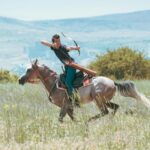Competitive equestrian events can be thrilling experiences for both riders and horses, but when your equine partner becomes anxious or nervous, the situation can quickly turn challenging. Horse competitions, with their unfamiliar environments, crowds, and high-energy atmospheres, naturally trigger stress responses in many horses. Even well-trained, normally calm horses can become tense, reactive, or difficult to manage when faced with the sensory overload of a competition setting. Understanding how to effectively calm and support your nervous horse during these high-pressure moments is crucial not only for performance success but also for safety and the well-being of your equine companion. This comprehensive guide explores practical strategies and techniques to help you recognize, manage, and soothe competition anxiety in your horse, allowing both of you to perform at your best when it matters most.
Understanding Competition Anxiety in Horses
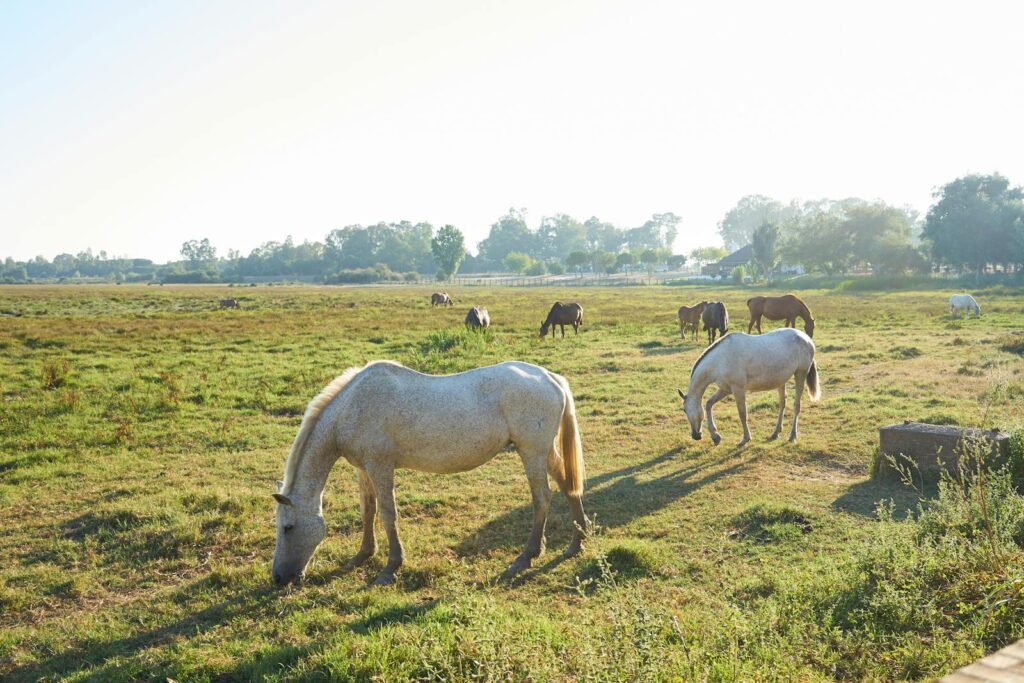
Horses are naturally vigilant animals whose survival in the wild depended on their ability to detect and flee from potential threats. This instinctive response doesn’t disappear with domestication and training, making competition environments particularly challenging with their unusual sights, sounds, and activities. A nervous horse might exhibit various physical signs including elevated heart rate, sweating, tight muscles, tail swishing, head tossing, or prancing. Behavioral indicators often include refusing to stand still, balking at obstacles, spooking at ordinary objects, or displaying resistance to rider cues. Understanding that these reactions stem from genuine fear or anxiety rather than disobedience is the first step in addressing the problem constructively. Each horse has individual anxiety triggers and expression patterns, so learning to read your specific horse’s body language and stress signals is essential for early intervention.
Preparation Begins at Home
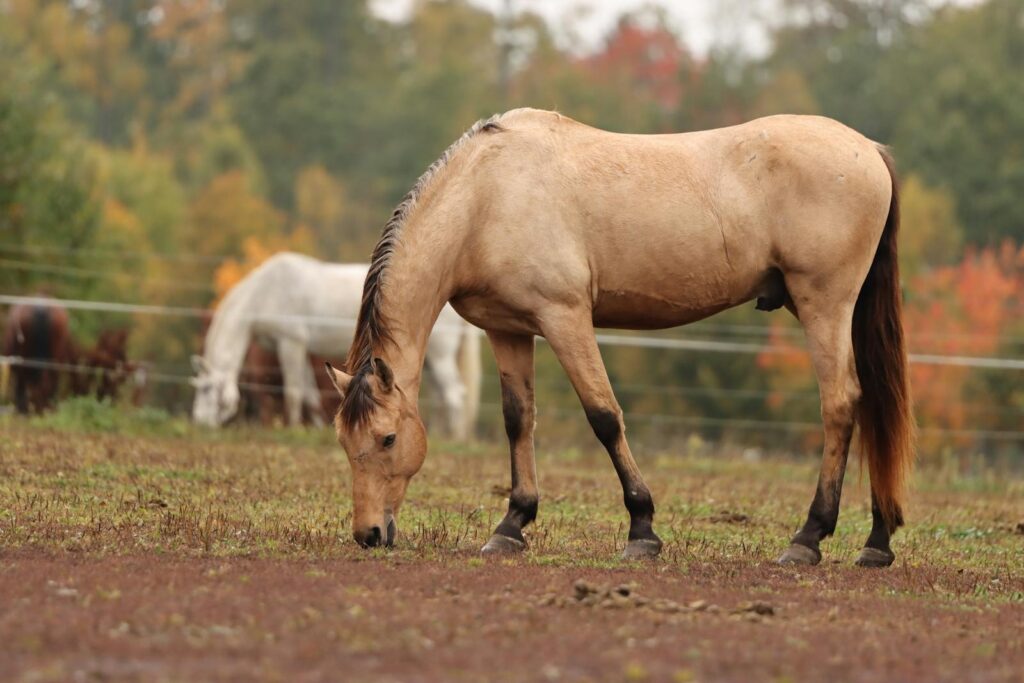
Managing competition anxiety starts long before you arrive at the event venue. Creating simulated competition environments during your regular training sessions helps desensitize your horse to the stressors they’ll encounter. Set up practice areas with colorful jumps, flapping flags, or unusual obstacles similar to what they might see at competitions. Gradually introduce distractions like playing recorded crowd noises, having friends watch your practice sessions, or riding alongside other horses in varying formations. Implement regular trailering practice so the transport experience becomes routine rather than stressful. Establishing rock-solid basics at home ensures your horse has reliable responses to your aids even when under pressure, giving them confidence in understanding what you’re asking regardless of surrounding distractions. Remember that consistent exposure to manageable levels of new experiences builds resilience without overwhelming your horse.
Arrive Early to Acclimate
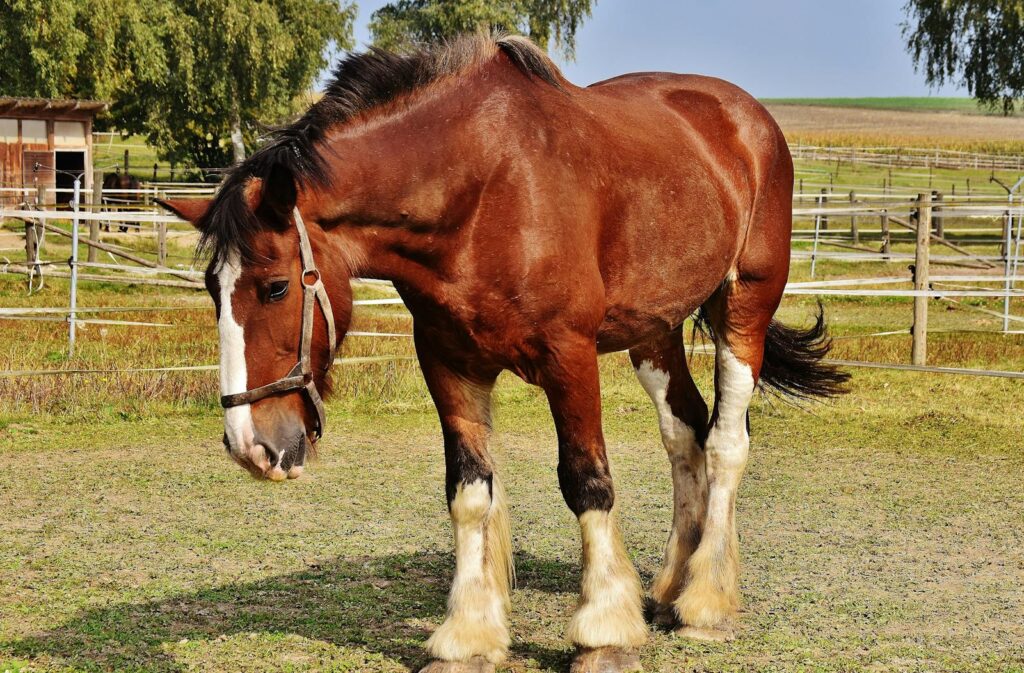
Rushing to a competition at the last minute guarantees heightened stress for both horse and rider. Plan to arrive well ahead of your scheduled performance time, ideally the day before for major events if facilities permit. This extra time allows your horse to explore the new environment, become familiar with the sights and sounds, and settle into the temporary stabling arrangement. Use this acclimation period to hand-walk your horse around the venue, showing them the competition arenas, warm-up areas, and potentially frightening features like loudspeakers or fluttering banners. Allow them to investigate intimidating objects at their own pace while you remain calm and reassuring. Many experienced competitors find that arriving early enough to work their horse in the competition ring during quiet periods dramatically reduces performance-day anxiety. This environmental familiarity creates a foundation of security that can significantly improve your horse’s comfort level when it’s time to compete.
Establish a Consistent Pre-Competition Routine

Horses thrive on predictability, especially in unfamiliar situations. Developing a consistent pre-competition routine provides your horse with comforting structure amidst the chaos of an event. This routine might include a specific grooming sequence, a particular order of tacking up, or certain stretches and warm-up exercises performed in the same sequence each time. Maintain your regular feeding schedule as closely as possible, as digestive consistency helps prevent stress-related stomach issues. Plan your warm-up timing to allow adequate preparation without excessive waiting that can build tension. Many successful riders incorporate a few minutes of groundwork or in-hand exercises into their pre-competition routine to establish focus and connection before mounting. When followed consistently across multiple competitions, these routines become powerful anxiety-reducing cues, signaling to your horse that despite the unusual environment, the expectations remain familiar and achievable.
Manage Your Own Anxiety
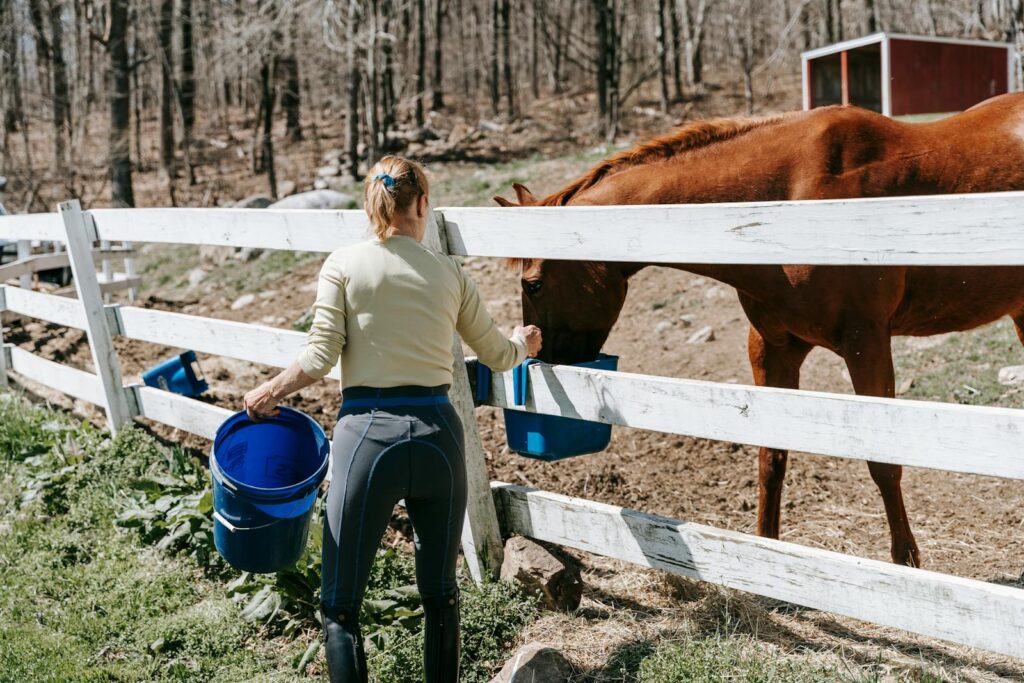
Horses are remarkably sensitive to their riders’ emotional states, often mirroring our anxiety in their own behavior. Your nervous tension transmits directly through your body position, muscle tension, breathing patterns, and even subtle changes in how you apply aids. Implementing personal stress management techniques such as deep breathing, visualization, or positive self-talk can significantly impact your horse’s emotional state. Arrive at competitions thoroughly prepared, with checklists completed and ample time allocated, to reduce your own last-minute stress. Some riders benefit from listening to calming music before competing or establishing their own confidence-building routines. Physical relaxation techniques like consciously dropping your shoulders, softening your hands, and deepening your seat can immediately influence your horse’s tension level. Remember that projecting calm confidence, even when you don’t entirely feel it, creates a supportive environment that helps your nervous horse find their own composure.
Effective Warm-Up Strategies

The competition warm-up arena often presents the most challenging environment your horse will encounter, with multiple riders working at cross purposes in a confined space. For particularly sensitive horses, consider starting your warm-up in a quieter area before entering the busy official warm-up space. Focus on forward movement with a steady rhythm to help your horse release tension through productive physical work. Incorporate frequent transitions between gaits and within gaits to maintain mental engagement and responsiveness. Many anxious horses benefit from brief but intense work periods interspersed with walking breaks where you can praise and reassure them. Avoid drilling difficult movements repeatedly, which can increase frustration and tension. Instead, build confidence by requesting movements or exercises you know your horse performs well, saving more challenging work for when they’ve settled. Always prioritize quality of movement and relaxation over the quantity of warm-up time, as an efficiently warmed-up horse maintains better focus than one who’s been working tensely for too long.
Ground Support Team Strategies
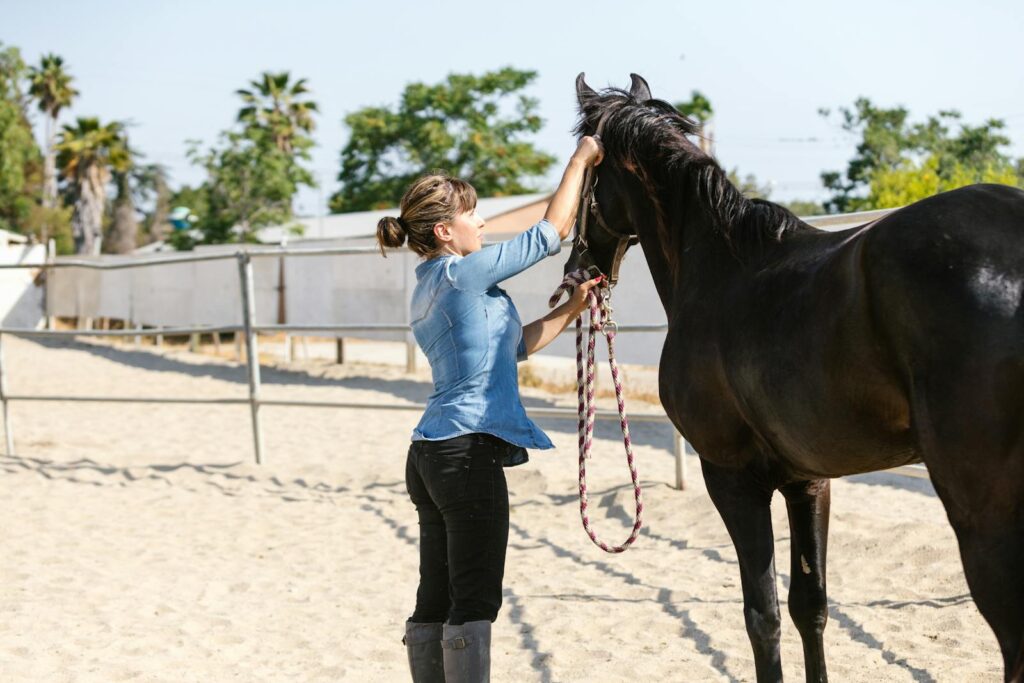
Having knowledgeable support people can dramatically improve your ability to manage a nervous horse at competitions. Designate specific roles to helpers, such as holding your horse while you walk the course, assisting with tack adjustments, or keeping spectators at a comfortable distance. Brief your support team on your horse’s specific triggers and calming techniques so they can provide appropriate assistance. An experienced ground person can offer valuable objective feedback about your horse’s stress level when you might be too focused on your riding to notice subtle changes. For extremely anxious horses, having a familiar companion horse nearby sometimes provides significant comfort. Your support team can also manage practical matters like ensuring water availability, proper shade, or administering electrolytes, allowing you to focus entirely on preparing mentally and physically for your performance. This coordinated approach creates a protective bubble of support around your nervous horse, minimizing external stressors during critical pre-performance moments.
Calming Supplements and Equipment

Various nutritional supplements are marketed for their calming effects on horses, including magnesium, B-vitamins, tryptophan, and herbal preparations containing valerian, chamomile, or passionflower. While these may benefit some horses, research results on their effectiveness remain mixed, and individual responses vary significantly. If considering supplements, test them at home during training sessions before relying on them at competitions. Consult your veterinarian to ensure any supplement complies with competition regulations and doesn’t interact with medications. Equipment options like pressure wraps, ear bonnets to reduce noise, or certain types of nosebands may help some horses manage sensory overstimulation. Careful habituation to these items at home is essential before using them in competition. Some riders report success with aromatherapy using lavender or other calming scents applied to their horse’s nostrils or their own hands. Remember that no supplement or equipment replaces proper training and preparation, but they may provide additional support for particularly sensitive individuals when used appropriately.
Groundwork Techniques for Immediate Calming

Targeted groundwork exercises can serve as effective tools for refocusing an anxious horse and rebuilding their connection with you before competing. Simple but purposeful leading exercises where you ask for precise stops, turns, and changes of pace can redirect your horse’s attention from environmental distractions back to you. Backing exercises are particularly useful for horses that become rushy or forward-focused under stress, as backing engages different neural pathways and can interrupt anxiety patterns. For horses that benefit from movement, controlled lunging with frequent direction changes keeps their mind engaged while allowing energy release. Some handlers successfully employ pressure and release techniques like gently pressing on the poll or chest until the horse lowers their head or takes a deep breath. These groundwork moments don’t need to be lengthy – often just 5-10 minutes of focused interaction can reset a nervous horse’s emotional state and reestablish the partnership before mounting.
In-Saddle Techniques for Managing Anxiety
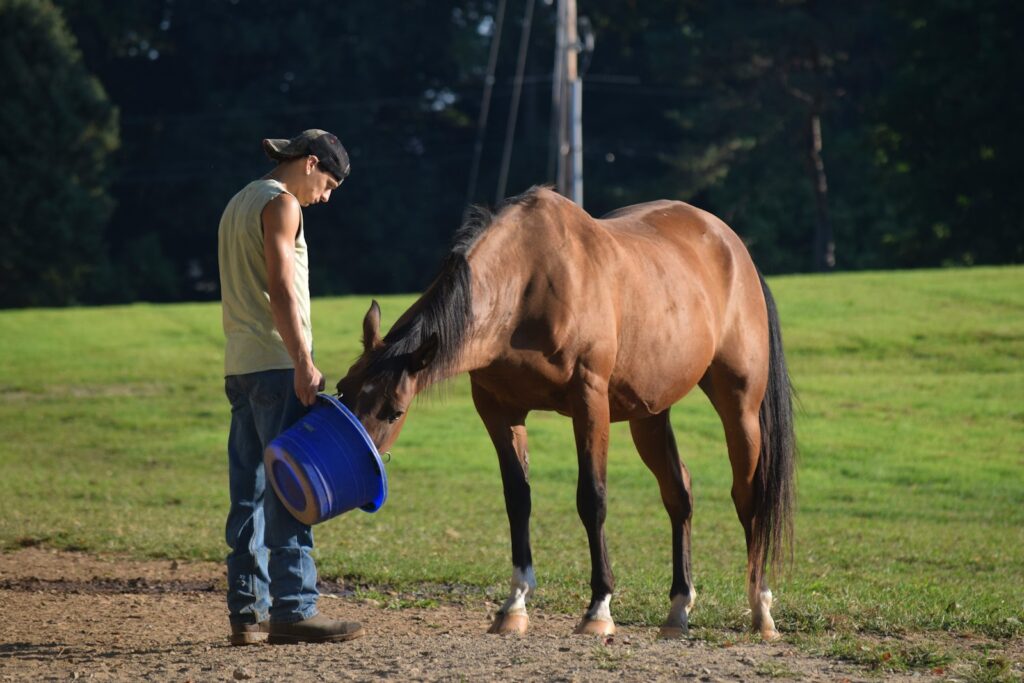
Once mounted, certain riding approaches can help maintain your horse’s composure during anxious moments. Establishing and maintaining a consistent rhythm is particularly calming for most horses, as the predictable pattern provides security. Keep your horse actively thinking by incorporating frequent but simple changes – shallow serpentines, circles of varying sizes, or transitions between and within gaits prevent them from fixating on scary stimuli. When you feel tension building, temporarily simplify your requests rather than demanding more difficult work until the horse regains composure. Use half-halts strategically to rebalance and reconnect without restricting forward movement, which can compound anxiety. Some horses respond well to momentary releases of tension through controlled forward movement, such as a brief trot or canter stretch in a non-threatening direction, followed by a return to more collected work. Throughout your ride, maintain consistent, clear aids while breathing deeply yourself, as rhythmic breathing influences your horse’s respiration pattern and overall tension level.
Handling Acute Anxiety Episodes
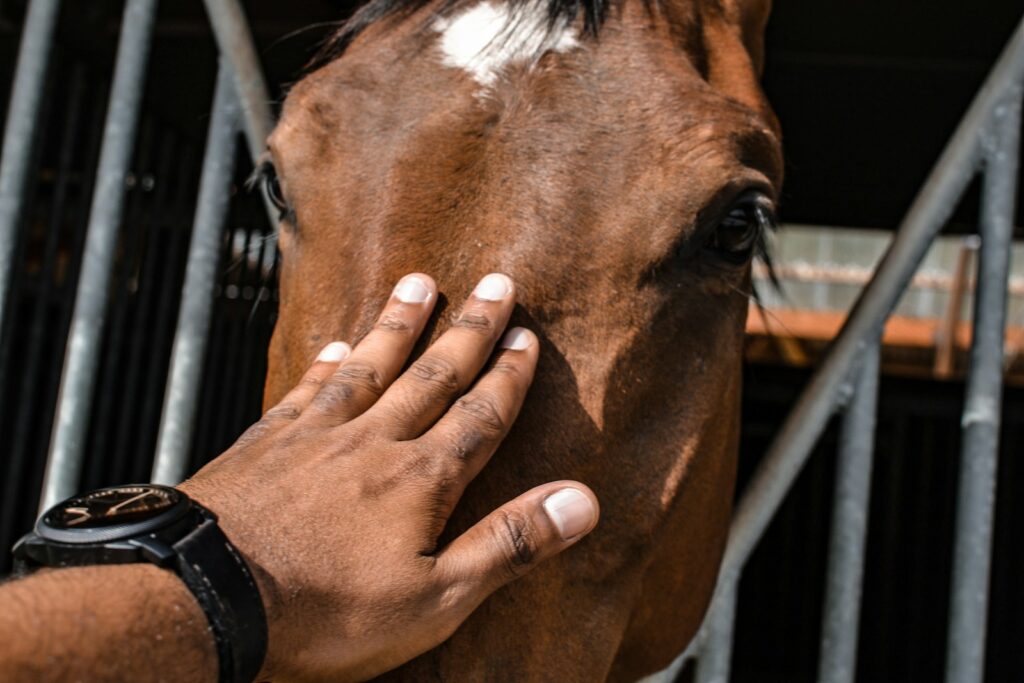
Despite thorough preparation, some horses may experience moments of acute anxiety or panic during competitions. Recognizing the early warning signs allows for intervention before the situation escalates to dangerous behavior. If your horse becomes extremely tense, create mental and physical space by moving to a quieter area if possible, even if that means temporarily leaving the competition arena (when rules permit). Simplify your requests immediately, focusing on basic forward movement rather than precision or collection. Speak calmly and reassuringly while maintaining secure but not restrictive contact through the reins. Some horses respond well to rhythmic patting on the neck or shoulder to interrupt the escalating anxiety cycle. If safely possible, dismounting and performing brief groundwork can reset a horse that has become overwhelmingly anxious. Safety always takes precedence over competition goals, so be prepared to withdraw if your horse’s anxiety reaches a level where either of you might be at risk. Remember that effectively handling these moments builds your horse’s trust in your leadership for future competitions.
Post-Performance Care
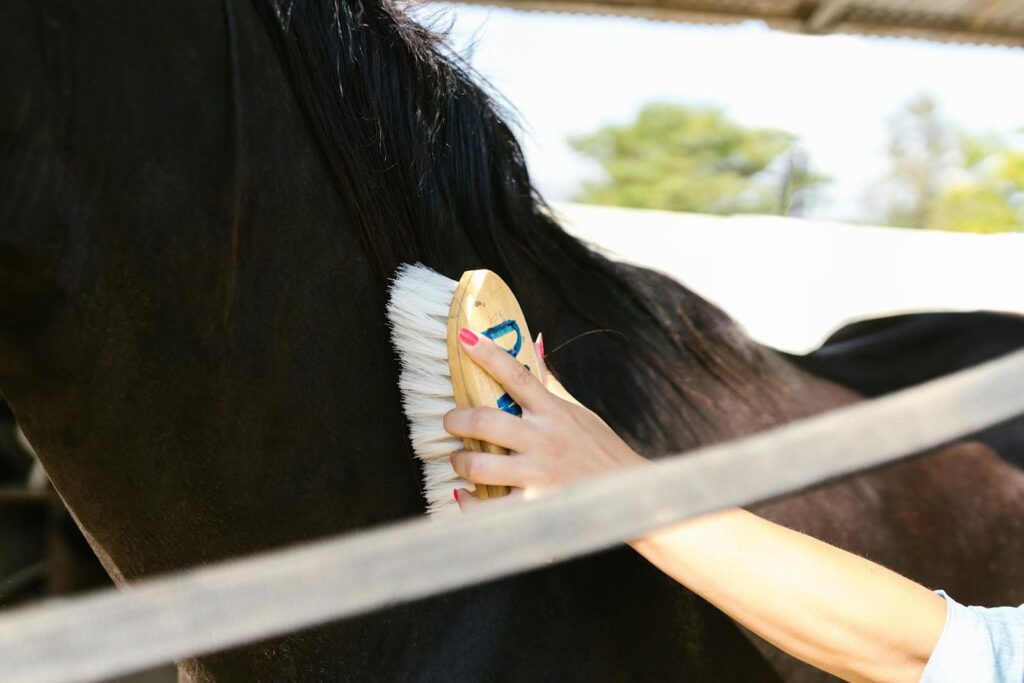
How you handle your horse immediately after competing significantly impacts their long-term perception of competition environments. Regardless of your performance outcome, greet your horse with calm praise and reassurance as you exit the competition arena. Allow sufficient cool-down time with relaxed walking to help their nervous system transition from the high-alert state back to baseline. Some horses benefit from immediate light grooming or massage to release muscle tension accumulated during the stressful performance. Provide fresh water and appropriate post-exercise nutrition to support physical recovery from the added exertion that anxiety causes. Take time to assess what went well and what triggered anxiety during this particular competition, making notes while observations are fresh in your mind. This consistent, positive post-performance routine helps your horse associate the end of competition with relief and reward rather than continued tension. Over time, this positive association can reduce anticipatory anxiety at future events.
Building Confidence Through Progressive Exposure

For particularly anxious horses, a structured approach to competition exposure often yields better results than full immersion. Consider starting with smaller, quieter schooling shows or clinic environments before advancing to larger, more stimulating competitions. At initial events, focus entirely on your horse’s emotional comfort rather than competitive success, perhaps even entering classes below your actual skill level to ensure positive experiences. Gradually increase the challenge level only after your horse demonstrates confidence at the current level. Some trainers recommend attending competitions initially just for schooling (not competing), then progressing to competing in early morning classes when venues are quieter, before eventually handling busier afternoon time slots. Document specific environmental elements that trigger anxiety at each outing, then create targeted desensitization exercises for these specific stimuli during home training sessions. This methodical approach builds a foundation of positive associations and coping skills that serves nervous horses better than repeated exposure to overwhelming situations.
When to Seek Professional Help

While many nervous horses improve with consistent, appropriate handling, some cases require professional intervention. Consider consulting an equine behaviorist if your horse’s anxiety seems excessive, doesn’t improve with standard management techniques, or poses safety risks to themselves or handlers. Veterinary evaluation is warranted if the anxiety onset was sudden, as pain or medical conditions can manifest as nervous behavior. An experienced trainer specializing in anxious horses might offer valuable perspective on whether your current training approach needs adjustment. Professional help is particularly important if you find yourself becoming fearful of your horse’s reactions, as rider fear compounds equine anxiety in a dangerous cycle. Some competition-anxious horses benefit from a training tune-up with professionals who regularly compete in high-pressure environments. Remember that seeking help isn’t an admission of failure but rather a commitment to finding the most effective support for your horse’s specific needs.
Conclusion

Successfully managing a nervous horse during competition requires a multi-faceted approach combining thorough preparation, thoughtful management strategies, and responsive handling techniques. By understanding your horse’s specific anxiety triggers and expressions, you can develop a personalized support plan that builds confidence over time. Remember that competition anxiety rarely resolves overnight – consistent application of appropriate techniques across multiple events gradually reshapes your horse’s emotional association with competitive environments. The bond of trust you develop through effectively supporting your horse through challenging situations strengthens your partnership far beyond the competition arena. With patience, empathy, and strategic preparation, many nervous horses can learn to navigate competitive settings with growing confidence, allowing both horse and rider to perform to their potential even under pressure.







